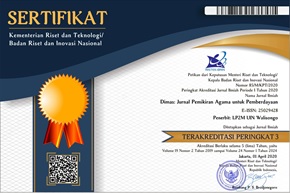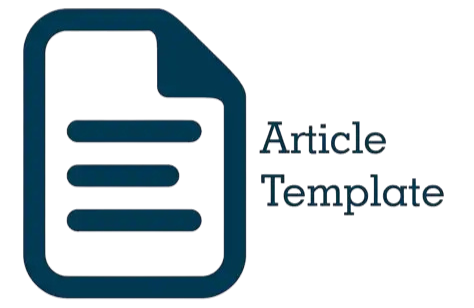The Development of Religious Moderation in the Multicultural Community of Sindang Sari Village, Tanjung Bintang District, South Lampung Regency
DOI:
https://doi.org/10.21580/dms.2023.232.14366Keywords:
Conflict, Multicultural, Religious ModerationAbstract
Multiculturalism is the nature of human life to live side by side, not in conflict. Sindang Sari Village is multicultural because it has various religions and ethnic groups. This potential needs to be managed by instilling valuesabout religious moderation. It does not have to wait for conflict to occur but needs to be done as early as possible as a preventive measure so that undesirable things do not happen. This service method is divided into two groups consisting of religious leaders, elder community leaders and youth leaders. Service provides pre-tests and post-tests to measure people’s understanding of religious moderation and tolerance. The results of the pre-test showed sufficient mutual respect without any social contact. After the service, the results of the post-test show a significant increase in understanding that religious moderation is not only done by respecting each other but by carrying out acts of mutual friendship, cooperation in cooperation, and mutual help.
Downloads
References
Abdillah, Masykuri. 2003. “Toleransi Beragama Dalam Masyarakat Demokrasi Dan Multikultural.” In Konflik Komunal Di Indonesia Saat Ini, edited by W.A.L Stokhof and Murni Djamal. Leiden-Jakarta: INIS bekerjasama dengan Pusat Bahasa dan Budaya UIN Syarif Hidayatullah.
Akhmadi, Agus. 2019. “Moderasi Beragama Dalam Keragaman Indonesia.” Jurnal Diklat Keagamaan 13, no. 2: 45–55.
Anwar, Chairul. 2019. Multikulturalisme, Globalisasi, Dan Tantangan Pendidikan Abad Ke-21. Yogyakarta: Diva Press.
Arifinsyah, Safria Andy, and Agusman Damanik. 2020. “The Urgency of Religious Moderation in Preventing Radicalism in Indonesia.” Esensia 21, no. 1: 91–107.
Aziz, Ahmad Amir. 1999. Neo-Modernisme Islam Di Indonesia: Gagasan Sentral Nurcholish Madjid Dan Abdurrahman Wahid. Jakarta: Rineka Cipta.
Burhani, Ahmad Najib. 2021. “Virus Kebencian.” Kompas, September 2021.
Chotimah, Dien Nur, and Sutaman Sutaman. 2020. “Penguatan Relasi Multikultural Dengan Literasi Digital Di Desa Pait Kasembon Malang.” Dimas: Jurnal Pemikiran Agama Untuk Pemberdayaan 20, no. 1: 75. https://doi.org/10.21580/dms.2020.201.5278.
Dodego, Subhan Hi Ali, and Doliwitro. 2020. “The Islamic Moderation And The Prevention Of Radicalism And Religious Extremism In Indonesia.” Dialog; Jurnal Penelitian Dan Kajian Keagamaan 43, no. 2: 199–207.
Ghazali, Abd. Moqsith. 2009. Argumen Pluralisme Agama: Membangun Toleransi Berbasis Al-Qur’an. Depok: KataKita.
Hefni, Wildani, and Qurrotul Uyun. 2020. “Pendampingan Kader Pesantren Sebagai Aset Modal Sosial Dalam Penguatan Moderasi Beragama.” Dimas: Jurnal Pemikiran Agama Untuk Pemberdayaan 20, no. 2: 175. https://doi.org/10.21580/dms.2020.202.5452.
Irham, Muhammad Aqil, Idrus Ruslan, and Muhammad Candra Syahputra. 2021. “The Idea of Religious Moderation in Indonesian New Order and The Reform Era.” Ilmu Ushuluddin 8, no. 1: 1–22.
Ismail, Faisal. 2014. Dinamika Kerukunan Antar Umat Beragama. Bandung: Remaja Rosdakarya.
Isnaeni, Ahmad. 2014. “Kekerasan Atas Nama Agama.” Kalam: Jurnal Studi Agama Dan Pemikiran Islam 8, no. 2: 213–28.
Junaedi, Edi. 2019. “Inilah Moderasi Beragama Perspektif Kementerian Agama.” Jurnal Multikultural & Multi Religious 2, no. 18: 391–400.
Khaldun, Ibn. 2009. Muqaddimah. Jakarta: Pustaka Firdaus.
Levang, Patrice. 2003. Ayo Ke Tanah Sabrang: Transmigrasi Di Indonesia. Jakarta: Kepustakaan Populer Gramedia.
Liweri, Alo. 2003. Makna Budaya Dalam Komunikasi Antar Budaya. Yogyakarta: LKiS.
Madjid, Nurcholish. 2000a. Islam Doktrin Dan Peradaban. Jakarta: Paramadina.
———. 2000b. “Kedaulatan Rakyat: Prinsip Kemanusiaan Dan Musyawarah Dalam Masyarakat Madani.” In Membongkar Mitos Masyarakat Madani, edited by Widodo Usman. Yogyakarta: Pustaka Pelajar.
Mubarok, Zaki, Zakiyah Zakiyah, and Ani Khofifah. 2022. “Kiai as the Activator for Accelerating the Implementation of Child-Friendly Pesantren Based on the Local Wisdom.” Dimas: Jurnal Pemikiran Agama Untuk Pemberdayaan 22, no. 2: 321–48. https://doi.org/10.21580/dms.2022.222.13677.
Mustaqim, Abdul, and Braham Maya Baratullah. 2020. Moderasi Beragama Sebagai Paradigma Resolusi Konflik. Yogyakarta: Lintang Books.
Naim, Ngainun, and Achmad Sauqi. 2017. Pendidikan Multikultural: Konsep Dan Aplikasi. Yogyakarta: Ar-Ruzz Media.
Puspawidjaja, Rizani. 2006. Hukum Adat Dalam Tebaran Pemikiran. Bandar Lampung: Penerbit Universitas Lampung.
Rahmat, Abdul, and Mira Mirnawati. 2020. “MODEL PARTICIPATION ACTION RESEARCH DALAM PEMBERDAYAAN MASYARAKAT.” Jurnal Ilmu Pendidikan Nonformal 06, no. 01: 62–71.
Ruslan, Idrus, and Muhammad Aqil Irham. 2022. “The Role of Cultural Literacy and Peace Education in Harmonization of Religious Communities.” Journal of Social Studies Education Research 13, no. 3: 174–204.
Siroj, Said Aqil. 2015. Islam Sumber Inspirasi Budaya Nusantara. Jakarta Pusat: LTN NU.
Talbi, Mohamed. 1998. “Religious Liberty.” In Liberal Islam: A Sourcebook, edited by Charles Kurzman. New York.
Downloads
Published
Issue
Section
License
Copyright
The copyright of the received article shall be assigned to the journal as the publisher of the journal. The intended copyright includes the right to publish the article in various forms (including reprints). The journal maintains the publishing rights to the published articles. Therefore, the author must submit a statement of the Copyright Transfer Agreement.*)
Licensing

This work is licensed under a Creative Commons Attribution-ShareAlike 4.0 International License.
In line with the license, authors are allowed to share and adapt the material. In addition, the material must be given appropriate credit, provided with a link to the license, and indicated if changes were made. If authors remix, transform or build upon the material, authors must distribute their contributions under the same license as the original.
_______
*) Authors whose articles are accepted for publication will receive confirmation via email and send a Copyright Transfer Agreement.









